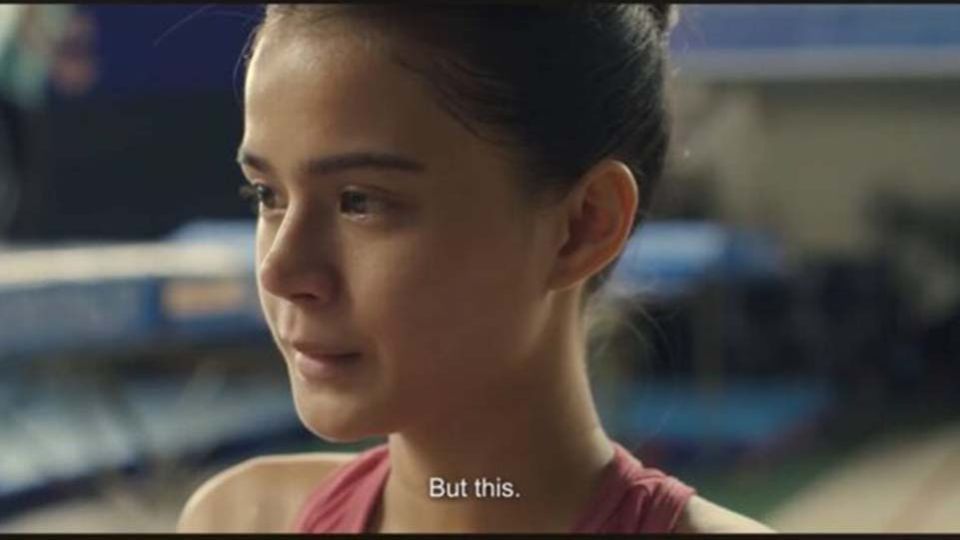August 6, 2025
MANILA – Nowadays, the word “girlhood” evokes thoughts of aesthetics and consumerist trends. Girl dinner, girl math, girl hobbies—the list of trendy buzzwords that revolve around girlhood keeps going on. In our lived reality, where iterations of girlhood are far too often romanticized, “Sunshine” (2025) offers a perspective of girlhood that brings us down to earth while allowing our dreams to reach the sky.
Maris Racal plays the titular Sunshine, a young gymnast who risks losing her national team slot because of an unplanned pregnancy. It’s a tale as old as time in the Philippines, as teenage pregnancy rates are alarmingly high. But this doesn’t make Sunshine’s character and story any less compelling. While multiple elements of the film feel rather fantastical, from Sunshine’s larger-than-life ambitions to hints of magical realism in the form of a young girl (child actress Annika Co) following her around to serve as her voice of reason (and criticism), director Antoinette Jadaone shines light on the ordinary and relatable.
Particularly, it’s Jadaone’s portrayal of Manila and its people that strikes a chord most. Scenes of the bustling streets of Quiapo bring viewers right to where Sunshine is, allowing them to feel the same sweltering heat and smoky air that she feels. Jadaone’s Quiapo is also riddled with deft paradoxes and dichotomies, such as abortifacients cradled in a store selling Marian statues and prayers asking for forgiveness despite being resolute in doing something perceived as a “sin.”
The biggest binary opposition here, however, is that of girlhood. Sunshine’s connection with Xyriel Manabat’s Thea is another testament to the strength of female friendships, while her sister Geleen (played by Jennica Garcia) shows how women allow other women to lean on them, even as they’ve got much to handle on their own. Integral to Sunshine’s story is coach Eden, brought to life by Meryll Soriano, who serves as Sunshine’s maternal figure as she shapes the young gymnast up for her dreams. In fleeting scenes, much proof of women showing up for one another can also be found: from Dr. Helena footing hospital bills to older mothers teaching new moms how to care for their babies.
READ: When artist-run spaces stop being romantic
As expected, the men of “Sunshine” are there to disappoint, if not completely infuriate the audience, even as they only appear in the film briefly. Sunshine’s boyfriend, Miggy (Elijah Canlas), has an air of snooty apathy reminiscent of how the irresponsibility of men has lasting consequences on women, while Uncle Bobot displays a sinister depravity that unfortunately reflects the disgusting reality of incestual rape in the Philippines. Pastor Jaime, a special role played by Piolo Pascual, is not safe from being frustrating despite his seemingly good intentions, as he represents a privileged male point of view when offering to shoulder Sunshine’s maternal expenses without considering Sunshine’s aversion towards motherhood.
As expected, the men of “Sunshine” are there to disappoint, if not completely infuriate the audience, even as they only appear in the film briefly. Sunshine’s boyfriend, Miggy (Elijah Canlas), has an air of snooty apathy reminiscent of how the irresponsibility of men has lasting consequences on women, while Uncle Bobot displays a sinister depravity that unfortunately reflects the disgusting reality of incestual rape in the Philippines. Pastor Jaime, a special role played by Piolo Pascual, is not safe from being frustrating despite his seemingly good intentions, as he represents a privileged male point of view when offering to shoulder Sunshine’s maternal expenses without considering Sunshine’s aversion towards motherhood.
READ: Recognizing—and earning—their famous last names’ worth
Though these characters are good for one thing: they bring out a primal “female rage” in Racal’s Sunshine that feels satisfying to watch every single time. Reality often condemns women for showing emotions that don’t seem “ladylike,” but the film allows Sunshine to crash out as she pleases, breaking bottles and car windows in the process, middle fingers up unabashedly. “This too is girlhood,” she exclaims, because our ideas of femininity need not be limited to overt romanticizations.
While there’s joy in the fact that films like this can be made and screened on a larger scale, many Filipinos still hold hostile beliefs about abortion and teenage pregnancy, often placing all the blame and shame on the victimized women instead of trying to understand their plights. A lack of true separation between church and state hinders life-saving legislation from being passed on a national scale. Women, both in the Philippines and worldwide, continue to risk their own lives supposedly in the name of life itself.
True to its name, however, “Sunshine” feels like a ray of light on conversations usually left shrouded in the dark. Watching “Sunshine” allows you to leave the cinema as a changed person, with full knowledge that you’re returning to an unchanging world, but that doesn’t have to stop you from hoping that the world starts changing anyway.


